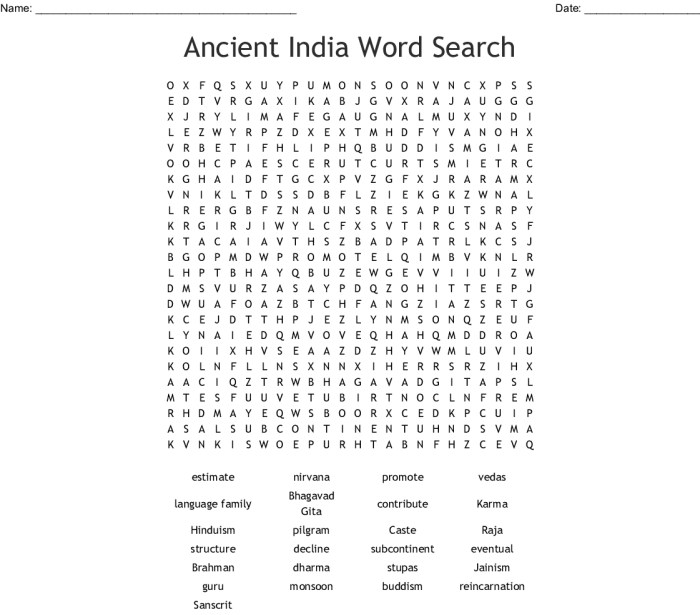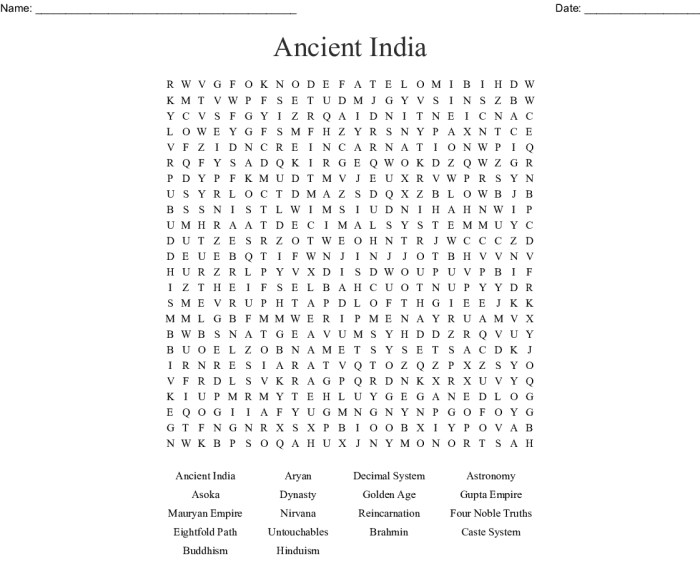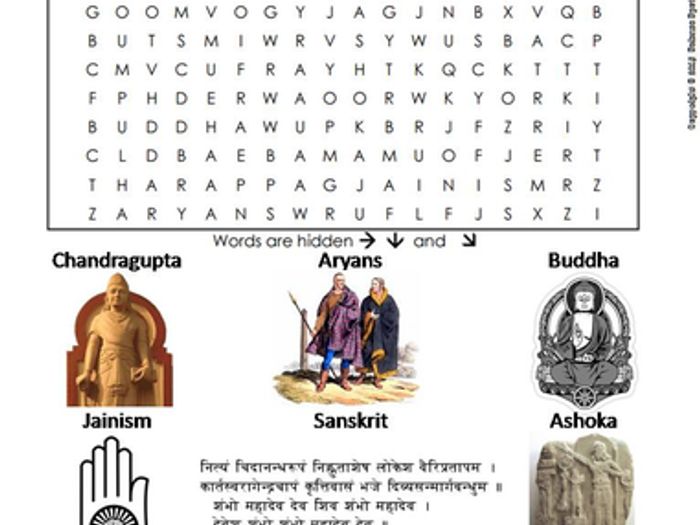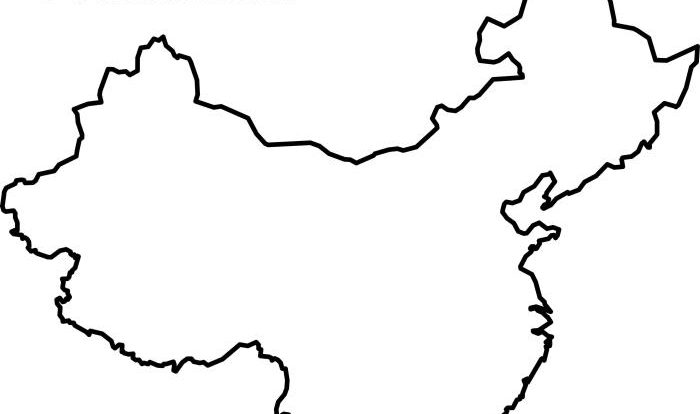Ancient india word search answers – Embark on an enlightening journey through the enigmatic tapestry of ancient India with our comprehensive guide to word search answers. Dive into the depths of history, unraveling the mysteries of this ancient civilization through engaging word puzzles that ignite curiosity and enhance understanding.
Prepare to uncover the origins and evolution of ancient India, explore its profound religions and philosophies, delve into its rich literary heritage, and marvel at its architectural wonders. Our meticulously crafted word search answers provide a roadmap through the labyrinth of ancient India’s scientific advancements, social structures, and cultural traditions, offering a captivating glimpse into the cradle of civilization.
Ancient Indian Civilization

The ancient Indian civilization, one of the world’s oldest and most influential, emerged in the Indus Valley region around 3300 BCE. It flourished for over a thousand years, developing advanced cities, sophisticated systems of government, and a rich cultural and religious tradition.
Origins and Development
- Indus Valley Civilization (3300-1900 BCE): Characterized by large cities like Harappa and Mohenjo-daro, standardized weights and measures, and a written script.
- Vedic Period (1500-500 BCE): The arrival of Indo-Aryan tribes from Central Asia introduced the Vedas, sacred texts that laid the foundation for Hinduism.
- Mauryan Empire (322-185 BCE): Under Emperor Ashoka, the Mauryan Empire unified much of the Indian subcontinent, promoting Buddhism and establishing a centralized administration.
- Gupta Empire (320-550 CE): A period of prosperity and cultural achievement, known for its advances in art, literature, and science.
Geographical and Cultural Influences
- Geography: The vast and diverse landscape of India, with its fertile river valleys, mountain ranges, and coastline, shaped its civilization.
- Trade: Trade with neighboring regions, such as Mesopotamia and China, brought cultural influences and technological advancements.
- Religion: The Indus Valley Civilization showed evidence of religious practices, while the Vedic period witnessed the rise of Hinduism and other religions.
Ancient Indian Religion and Philosophy

Major Religions
- Hinduism: A polytheistic religion with a vast pantheon of gods and goddesses, emphasizing karma, reincarnation, and the pursuit of spiritual liberation.
- Buddhism: Founded by Siddhartha Gautama, Buddhism focuses on the Four Noble Truths and the Eightfold Path to end suffering.
- Jainism: An ancient religion that emphasizes non-violence, self-control, and the liberation of the soul.
Key Beliefs and Practices
- Karma: The belief that actions in this life determine one’s fate in the next.
- Reincarnation: The concept that the soul is reborn into different forms of existence.
- Meditation: A central practice in many Indian religions, used to achieve spiritual insight and enlightenment.
Philosophical Concepts
- Upanishads: Ancient texts that explore the nature of reality, the soul, and the universe.
- Vedanta: A philosophical system that emphasizes the unity of all existence and the ultimate goal of self-realization.
- Yoga: A system of physical, mental, and spiritual practices aimed at achieving union with the divine.
Ancient Indian Literature

Major Literary Works, Ancient india word search answers
- Vedas: Sacred texts containing hymns, rituals, and philosophical teachings.
- Upanishads: Ancient philosophical treatises that explore the nature of reality and the soul.
- Ramayana: An epic poem attributed to Valmiki, narrating the adventures of Lord Rama.
- Mahabharata: The world’s longest epic poem, depicting the struggle between the Pandavas and Kauravas.
Themes and Characters
- Dharma: The concept of righteousness and duty, central to many Indian epics.
- Karma: The consequences of one’s actions, a recurring theme in Indian literature.
- Gods and goddesses: The presence of divine beings and their influence on human affairs.
Significance
- Cultural Heritage: Ancient Indian literature has played a vital role in shaping Indian culture and identity.
- Religious Inspiration: The Vedas and Upanishads have been foundational texts for Hinduism and other Indian religions.
- Literary Legacy: The epics and other works of ancient Indian literature continue to inspire and entertain readers worldwide.
FAQ Section: Ancient India Word Search Answers
What is the significance of the Indus Valley Civilization in ancient India?
The Indus Valley Civilization, also known as the Harappan Civilization, flourished in the northwestern regions of ancient India from around 2600 to 1900 BCE. It is considered one of the earliest urban civilizations in the world, showcasing advanced city planning, sanitation systems, and a sophisticated script.
How did Buddhism influence ancient Indian society?
Buddhism, founded by Siddhartha Gautama in the 6th century BCE, became a major religion in ancient India. Its teachings emphasized non-violence, compassion, and the pursuit of enlightenment. Buddhism had a profound impact on Indian culture, art, and philosophy, and its influence continues to be felt throughout the world today.
What are the key features of ancient Indian architecture?
Ancient Indian architecture is renowned for its grandeur, intricate carvings, and symbolic significance. Temples, palaces, and stupas were built according to specific rules and proportions, often incorporating elements from nature and religious beliefs. The use of domes, arches, and pillars is a distinctive characteristic of Indian architecture.
